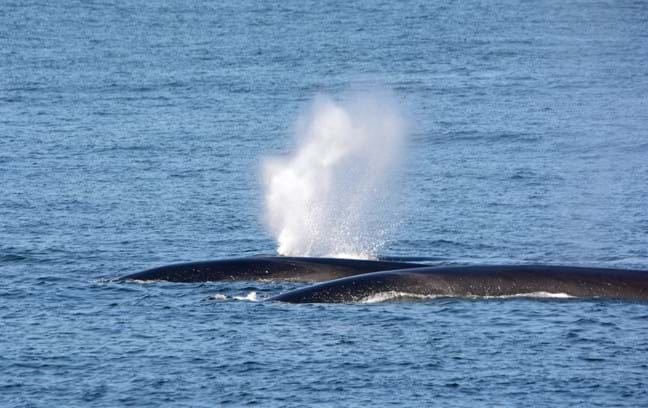
Oceanex joins fleet of trained whale watchers
Quebec City, April 11, 2018 – The intermodal transportation leader to Newfoundland and Labrador from anywhere in North America, Oceanex has swelled the ranks of sailors volunteering as whale observers for the Réseau d’observation de mammifères marine (ROMM). The crews of the Oceanex Sanderling, the Oceanex Connaigra and the Oceanex Avalon will be given special training to qualify them to gather whale observation data during their voyages. Véronique Nolet, a biologist and Green Marine program manager, will conduct the onboard training starting tomorrow.
« Oceanex is proud to participate in ROMM’s data collection as a way to concretely help in whale conservation by acquiring more knowledge about these animals,” says Lionel Duchatelle, the fleet’s manager. “The data will be collected directly along our navigational routes, often in sectors where or during times of the year when data collection are virtually non-existent, which adds to its relevance.”
ROMM initiated the maritime industry’s participation in the data collection regarding marine mammals in 2015 with Groupe Desgagnés and Canada Steamship Lines, a division of the CSL Group. Green Marine subsequently became a part of the project financed by the Government of Canada through its Habitat Stewardship for Species at Risk program to develop the required training materials and facilitate networking with ship owners.
In only a few years, nearly 1,700 marine mammal observations have been collected by the crews aboard the vessels owned by Desgagnés, CSL, and more recently ferries running between Trois-Pistoles and les Escoumins (operated by Compagnie de navigation des Basques), and the Matane, Baie-Comeau and Godbout destinations (operated by the Société des traversiers du Québec) within the province of Quebec. The addition of important players, such as Oceanex, promises to make 2018 a successful year. The collected data is disseminated publicly through the St. Lawrence Global Observatory website at www.slgo.ca/en/
“The maritime industry’s commitment to this project has extremely positive implications for whale conservation,” affirms Esther Blier, ROMM’s executive director. “In addition to collecting essential information, the initiative helps to educate crews to the presence of endangered whales within their navigational realm, and to take actions during these encounters to limit or report collisions. The collaboration also increases multifold the opportunities to sensitize crews to respect voluntary measures that benefit whales, such as the voluntary speed reduction established in the St. Lawrence Estuary.”
“Oceanex makes numerous trips within the St. Lawrence Estuary, and these many passages will help us to collect accurate benchmark data throughout the season about the presence of marine mammals within this navigational corridor,” adds Nolet.
The addition of the three Oceanex ships will bring the number of trained whale observation vessel teams to approximately 25, with additional observations made from shorelines and ferries in Matane, Godbout, Baie-Comeau, Rivière-du-Loup and Tadoussac and through an evolving collaboration with marine pilots.
Download the PDF
Credit: Fin whale, Sandrine Payant Levesque